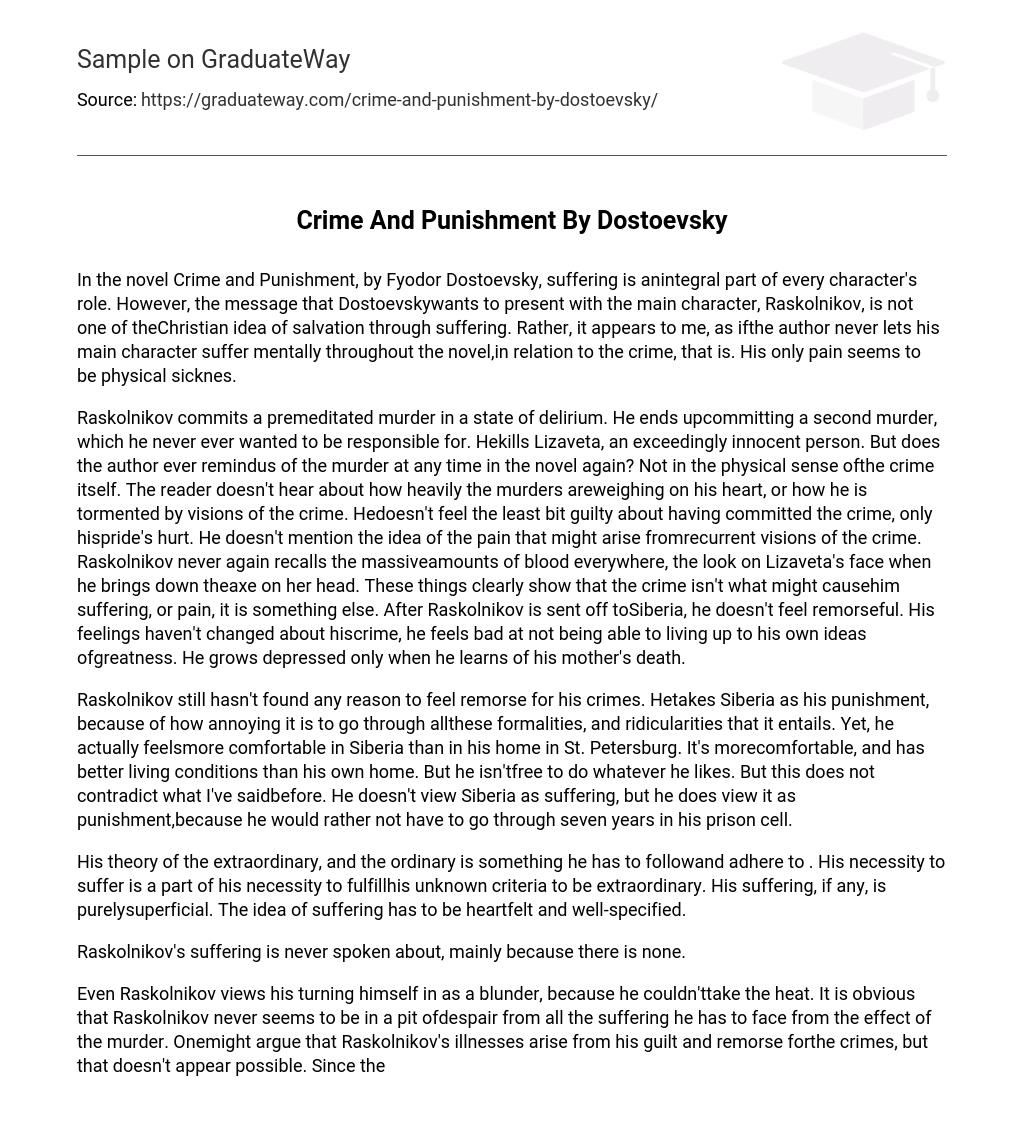In the novel Crime and Punishment, by Fyodor Dostoevsky, suffering is anintegral part of every character’s role. However, the message that Dostoevskywants to present with the main character, Raskolnikov, is not one of theChristian idea of salvation through suffering. Rather, it appears to me, as ifthe author never lets his main character suffer mentally throughout the novel,in relation to the crime, that is. His only pain seems to be physical sicknes.
Raskolnikov commits a premeditated murder in a state of delirium. He ends upcommitting a second murder, which he never ever wanted to be responsible for. Hekills Lizaveta, an exceedingly innocent person. But does the author ever remindus of the murder at any time in the novel again? Not in the physical sense ofthe crime itself. The reader doesn’t hear about how heavily the murders areweighing on his heart, or how he is tormented by visions of the crime. Hedoesn’t feel the least bit guilty about having committed the crime, only hispride’s hurt. He doesn’t mention the idea of the pain that might arise fromrecurrent visions of the crime. Raskolnikov never again recalls the massiveamounts of blood everywhere, the look on Lizaveta’s face when he brings down theaxe on her head. These things clearly show that the crime isn’t what might causehim suffering, or pain, it is something else. After Raskolnikov is sent off toSiberia, he doesn’t feel remorseful. His feelings haven’t changed about hiscrime, he feels bad at not being able to living up to his own ideas ofgreatness. He grows depressed only when he learns of his mother’s death.
Raskolnikov still hasn’t found any reason to feel remorse for his crimes. Hetakes Siberia as his punishment, because of how annoying it is to go through allthese formalities, and ridicularities that it entails. Yet, he actually feelsmore comfortable in Siberia than in his home in St. Petersburg. It’s morecomfortable, and has better living conditions than his own home. But he isn’tfree to do whatever he likes. But this does not contradict what I’ve saidbefore. He doesn’t view Siberia as suffering, but he does view it as punishment,because he would rather not have to go through seven years in his prison cell.
His theory of the extraordinary, and the ordinary is something he has to followand adhere to . His necessity to suffer is a part of his necessity to fulfillhis unknown criteria to be extraordinary. His suffering, if any, is purelysuperficial. The idea of suffering has to be heartfelt and well-specified.
Raskolnikov’s suffering is never spoken about, mainly because there is none.
Even Raskolnikov views his turning himself in as a blunder, because he couldn’ttake the heat. It is obvious that Raskolnikov never seems to be in a pit ofdespair from all the suffering he has to face from the effect of the murder. Onemight argue that Raskolnikov’s illnesses arise from his guilt and remorse forthe crimes, but that doesn’t appear possible. Since the character never citesthe murder for his sickness. In fact, Raskolnikov fell immediately sick aftercommitting the murder. How could he struck by guilt five seconds aftercommitting the murder when he hasn’t even had a chance to see what events havejust occurred? There is not a single instance when Raskolnikov, or the authorfor that matter, ever cite the dramatic effect of the murders on Raskolnikov’sconscience for his terrible illness. Nothing in the novel would even imply thathe feels remorse about committing the murders, it is just a silly idea that hasbeen implanted in people’s minds and the seed has spread too rapidly, withoutanalization.It is incredibly obvious that all the so-called pain and sufferingthat Raskolnikov feels is untrue, silly, and backed by no support. It would beincredulously moronic to attempt to view it from another point of understanding.
People are entitled to their own opinions but the beliefs of the at errormajority should not overbear the beliefs of the correct minority. Acceptance ofa theory without analysis of it is ignorance.
English Essays





